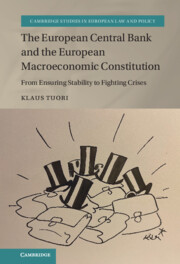 The European Central Bank and the European Macroeconomic Constitution
The European Central Bank and the European Macroeconomic Constitution from Part II - Crises, ECB Measures and the Macroeconomic Constitution
Published online by Cambridge University Press: 15 September 2022
The series of crises started with the global financial crisis that gained speed with the collapse of Lehman Brother in Autumn 2008. The ECB as any other major central bank became deeply involved in solving the crisis, which had eroded banks’ ability to trust each other. The ECB provided increasing amounts of liquidity to banks, and in many ways replaced interbank markets with its own operational framework. Other exceptional measures included easing and expanding of accepted collateral, purchases of high-quality covered bonds issued by banks. The constitutional analysis culminated on the question, whether the ECB measures can be classified as monetary policy. Generally, the provision of liquidity, even in some unusual forms, and its rationales were even classical monetary policy and similar to other central banks. The main objective was stability and sufficient liquidity in the euro area financial markets. The ECB did not give financial assistance to a Member State or their banks, and its independence was maintained. Only the later three-year LTROs could be assessed somewhat differently.
To save this book to your Kindle, first ensure no-reply@cambridge.org is added to your Approved Personal Document E-mail List under your Personal Document Settings on the Manage Your Content and Devices page of your Amazon account. Then enter the ‘name’ part of your Kindle email address below. Find out more about saving to your Kindle.
Note you can select to save to either the @free.kindle.com or @kindle.com variations. ‘@free.kindle.com’ emails are free but can only be saved to your device when it is connected to wi-fi. ‘@kindle.com’ emails can be delivered even when you are not connected to wi-fi, but note that service fees apply.
Find out more about the Kindle Personal Document Service.
To save content items to your account, please confirm that you agree to abide by our usage policies. If this is the first time you use this feature, you will be asked to authorise Cambridge Core to connect with your account. Find out more about saving content to Dropbox.
To save content items to your account, please confirm that you agree to abide by our usage policies. If this is the first time you use this feature, you will be asked to authorise Cambridge Core to connect with your account. Find out more about saving content to Google Drive.